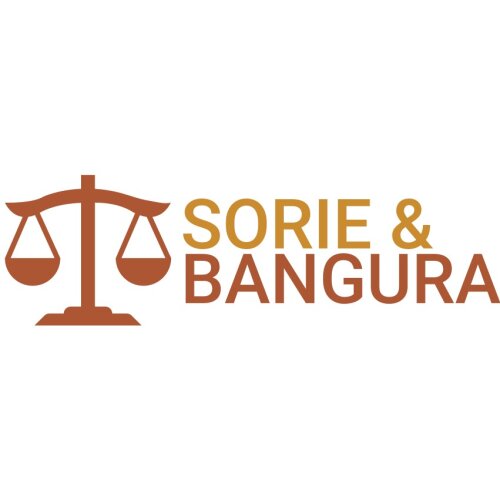Best Child Visitation Lawyers in Freetown
Share your needs with us, get contacted by law firms.
Free. Takes 2 min.
Free Guide to Hiring a Family Lawyer
List of the best lawyers in Freetown, Sierra Leone
About Child Visitation Law in Freetown, Sierra Leone
Child visitation refers to the schedule or rights granted to the non-custodial parent to spend time with their children following a separation or divorce. In Freetown, Sierra Leone, child visitation is primarily determined by the courts, ensuring that the best interests of the child are upheld. Visitation agreements may vary greatly depending on individual circumstances, such as the parents' relationship, their respective living situations, and the child's needs. The courts aim to facilitate a healthy and continuing relationship between the child and both parents whenever possible.
Why You May Need a Lawyer
There are several common situations where individuals may require legal assistance regarding child visitation, including:
- Disputes over visitation rights: When parents cannot agree on a visitation schedule, a lawyer can help mediate or represent one party in court.
- Modifying visitation arrangements: Changes in circumstances might necessitate adjusting an existing visitation schedule, requiring legal guidance to amend the court order.
- Enforcing visitation rights: If a custodial parent is not honoring the visitation agreement, legal assistance may be needed to enforce the order.
- Concerns about child safety: If there is evidence that a child may be unsafe during visitations, a lawyer can provide counsel on how to pursue appropriate legal action.
- Navigating legal complexities: Understanding the legal system and the specific laws in Sierra Leone can be challenging without professional assistance.
Local Laws Overview
In Sierra Leone, child visitation and custody matters are guided by both the Children’s Act of 2007 and customary law practices. Key aspects include:
- The best interest of the child: This principle is the paramount consideration in all decisions regarding child custody and visitation.
- Parental responsibilities: Both parents are encouraged to maintain an active role in their child's life unless it is demonstrated that such involvement would be detrimental to the child's welfare.
- Court mediation: Courts may mandate mediation to help parents reach an amicable visitation agreement before resorting to formal legal proceedings.
- Modification of orders: Orders can be reviewed and modified if there is a substantial change in circumstances that affects the child's welfare.
Frequently Asked Questions
1. What factors does the court consider in deciding visitation matters?
The court considers the child's age, the child's relationship with each parent, parental capabilities, and any history of abuse among other factors.
2. Can grandparents request visitation rights?
While the primary focus is on parental visitation, grandparents may petition the court for visitation rights in certain circumstances, particularly if they have a close relationship with the child.
3. What can I do if the other parent is not following the visitation schedule?
If the agreed visitation schedule is not being honored, you may need to seek legal enforcement through the courts, potentially with the assistance of a lawyer.
4. How can I change an existing visitation order?
To change an existing order, you’ll need to demonstrate that there has been a significant change in circumstances that warrants modification.
5. Are there specific provisions for handling emergencies during visitations?
It is advisable to include protocols for emergencies in the visitation agreement. If not addressed, the court may stipulate additional guidelines.
6. Is joint custody common in Freetown, Sierra Leone?
Joint custody may be considered if both parents are deemed capable and willing to cooperate in the upbringing of the child, taking into account the child’s best interests.
7. What happens if one parent wants to relocate with the child?
The relocating parent must typically seek permission from the court, which will assess how the move affects the child's best interests and the non-relocating parent's rights.
8. Can a child refuse visitation?
While a child's preferences may be considered, particularly if they are older, the court ultimately decides based on the child's best interests.
9. Can visitation rights be denied?
Visitation rights may be restricted or denied if there is evidence that visitation would be harmful to the child.
10. How long does it take to resolve a visitation dispute in court?
The time frame can vary, depending on the complexity of the case and court availability. Engaging a lawyer can help streamline the process.
Additional Resources
For further assistance, consider reaching out to the following resources:
- The Ministry of Social Welfare, Gender, and Children's Affairs: Provides support and advocacy for children's rights.
- Family Support Units in the Sierra Leone Police: Offers help with domestic and child-related issues.
- Legal Aid Board of Sierra Leone: Offers free legal assistance to those who qualify.
- Local Non-Governmental Organizations (NGOs): Various NGOs provide family services and legal support.
Next Steps
If you need legal assistance regarding child visitation, consider the following steps:
- Consult with a legal professional: Seek out a lawyer who specializes in family law to discuss your situation and receive tailored advice.
- Gather documentation: Collect any relevant documents that may support your case, including previous court orders or communication records.
- Explore mediation: Before escalating matters to court, mediation may be a viable option to resolve disputes amicably.
- Prepare for court proceedings: If legal proceedings are necessary, your lawyer will guide you in preparing your case and understanding the process.
Understanding your rights and the legal process can help you make informed decisions and strengthen your position regarding child visitation matters.
Lawzana helps you find the best lawyers and law firms in Freetown through a curated and pre-screened list of qualified legal professionals. Our platform offers rankings and detailed profiles of attorneys and law firms, allowing you to compare based on practice areas, including Child Visitation, experience, and client feedback.
Each profile includes a description of the firm's areas of practice, client reviews, team members and partners, year of establishment, spoken languages, office locations, contact information, social media presence, and any published articles or resources. Most firms on our platform speak English and are experienced in both local and international legal matters.
Get a quote from top-rated law firms in Freetown, Sierra Leone — quickly, securely, and without unnecessary hassle.
Disclaimer:
The information provided on this page is for general informational purposes only and does not constitute legal advice. While we strive to ensure the accuracy and relevance of the content, legal information may change over time, and interpretations of the law can vary. You should always consult with a qualified legal professional for advice specific to your situation.
We disclaim all liability for actions taken or not taken based on the content of this page. If you believe any information is incorrect or outdated, please contact us, and we will review and update it where appropriate.











